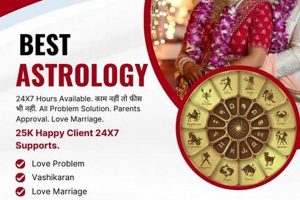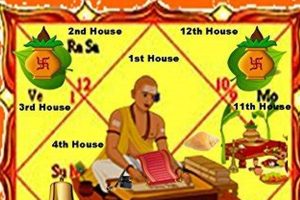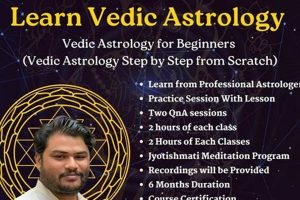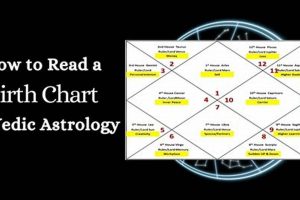Automated conversational agents powered by large language models are being employed to provide information related to the ancient Indian system of astrology known as Vedic Astrology. This involves using these tools to answer questions about astrological charts, planetary positions, and their interpretations based on Vedic principles. For instance, a user could inquire about the astrological significance of a specific planetary transit or request an interpretation of their birth chart according to Vedic traditions.
This application of artificial intelligence offers increased accessibility to Vedic astrological knowledge, potentially reaching a wider audience. By automating responses to common inquiries, it can provide quick and readily available information to those curious about Vedic astrology. This can also serve as an introductory resource, prompting further exploration of this complex subject with human astrologers. While Vedic astrology has a rich history and cultural significance, readily available interpretations offered through AI could contribute to its continued relevance in the modern era.
The intersection of artificial intelligence and Vedic astrology raises various topics for further discussion, including the accuracy and limitations of AI-generated interpretations, the ethical considerations surrounding automated astrological advice, and the potential impact on the traditional practice of Vedic astrology.
Utilizing automated resources for Vedic astrological information requires careful consideration and a discerning approach. The following tips offer guidance for navigating these tools effectively.
Tip 1: Verify the Source’s Credibility: Investigate the background and expertise of the individuals or organizations behind the automated platform. Look for affiliations with reputable Vedic astrology institutions or practitioners.
Tip 2: Understand the Limitations: Automated interpretations should be viewed as introductory information rather than definitive pronouncements. Recognize that the nuances and complexities of Vedic astrology often require human interpretation.
Tip 3: Supplement with Traditional Sources: Consult classic texts and experienced Vedic astrologers to gain a deeper understanding of the concepts and principles underlying automated interpretations.
Tip 4: Focus on Specific Questions: Frame inquiries clearly and concisely to obtain the most relevant information from automated resources. Avoid vague or open-ended questions.
Tip 5: Cross-Reference Information: Compare interpretations from multiple automated sources and traditional texts to identify potential inconsistencies or biases.
Tip 6: Avoid Over-Reliance: Do not solely depend on automated interpretations for making important life decisions. Seek professional guidance from qualified Vedic astrologers for personalized advice.
Tip 7: Maintain a Skeptical Mindset: Approach automated interpretations with a healthy degree of skepticism. Critically evaluate the information provided and seek further clarification when needed.
By following these tips, individuals can harness the potential of automated resources while mitigating potential drawbacks. A balanced approach that combines technological tools with traditional wisdom offers the most comprehensive understanding of Vedic astrology.
These tips represent a starting point for engaging with automated Vedic astrology platforms. A deeper exploration of individual needs and goals will further refine one’s approach.
1. Automated Consultations
Automated consultations represent a significant development within Vedic astrology facilitated by large language models like Chat GPT. These consultations leverage AI’s capacity to process and interpret vast datasets of astrological information, offering users readily available insights into their birth charts, planetary transits, and other astrological phenomena. This automation signifies a shift from traditional consultations with human astrologers, impacting accessibility, speed, and the nature of astrological advice itself. Consider, for example, a user seeking information about an upcoming planetary transit. An automated system could rapidly provide details about the transit’s astrological significance based on classical texts, offering a preliminary interpretation that a user might otherwise have sought from a human astrologer.
The rise of automated consultations presents both opportunities and challenges. Increased accessibility allows a wider audience to engage with Vedic astrology, potentially fostering greater understanding. However, the complexity of astrological interpretation necessitates caution. Automated systems excel at providing information based on pre-programmed rules and datasets, but may struggle with nuanced analysis requiring intuitive understanding and contextual awareness. For example, while an AI can identify planetary combinations associated with specific career paths, it may lack the capacity to integrate other chart factors and individual life circumstances crucial for accurate career guidance. This highlights the importance of discerning between automated information and personalized astrological advice from qualified practitioners.
Automated consultations within Vedic astrology offer a glimpse into the evolving relationship between technology and traditional practices. While these systems can provide valuable introductory information and facilitate astrological learning, they should be viewed as supplemental tools rather than replacements for human expertise. Recognizing the limitations of automated interpretation and seeking guidance from experienced astrologers remains essential for navigating the complexities of Vedic astrology and applying its insights meaningfully. Further exploration into the ethical implications and long-term effects of automated astrological advice is crucial as this technology continues to develop.
2. Accessibility of Information
The advent of AI-powered platforms offering Vedic astrological information represents a significant shift in accessibility. Traditionally, access to such knowledge required seeking out qualified astrologers, often involving geographical limitations and financial constraints. Automated systems powered by large language models, however, can provide information rapidly and at minimal cost, potentially democratizing access to this ancient practice. This increased accessibility necessitates careful examination of its multifaceted implications.
- Geographic Reach
One key aspect of increased accessibility relates to geographic reach. Individuals in remote areas or regions with limited access to Vedic astrologers can now utilize online platforms to obtain information previously unavailable. Someone seeking a basic birth chart interpretation in a location without practicing astrologers, for example, can now access such information through an AI-powered application. This expanded reach, however, also raises concerns about the potential for misinterpretation without the guidance of experienced practitioners.
- Financial Barriers
Traditional consultations with Vedic astrologers can represent a significant financial investment. Automated systems offer a more affordable alternative, allowing individuals with limited resources to explore Vedic astrology. This reduced financial barrier can broaden engagement with the practice, but also necessitates critical evaluation of the quality and depth of information provided by automated platforms compared to personalized consultations.
- Language Availability
AI-powered platforms can potentially offer Vedic astrological information in multiple languages, overcoming language barriers that previously restricted access for non-native speakers of languages commonly used in traditional Vedic astrology texts and practices. This multilingual capacity can contribute to wider understanding and appreciation of Vedic astrology across diverse linguistic communities. It also requires rigorous quality control to ensure accurate translations and interpretations across languages.
- 24/7 Availability
Unlike human astrologers, automated systems can operate continuously, providing information on demand at any time. This 24/7 availability offers convenience for users seeking information outside traditional consultation hours. However, this constant availability also requires careful consideration of the potential for over-reliance on automated systems and the importance of seeking personalized advice when needed.
While increased accessibility through AI-driven platforms offers significant potential for wider engagement with Vedic astrology, navigating this evolving landscape requires discernment. Balancing the advantages of readily available information with the need for qualified human guidance ensures responsible and meaningful application of Vedic astrological principles.
3. Interpretative Limitations
Interpretative limitations represent a crucial consideration within automated Vedic astrology platforms powered by large language models. While these models excel at processing vast datasets and identifying patterns, the nuanced and symbolic nature of Vedic astrology presents inherent challenges. A central limitation stems from the contextual nature of astrological interpretation. For example, a specific planetary combination might signify different outcomes depending on its placement within a birth chart, the individual’s life stage, and other astrological factors. Automated systems may struggle to integrate these contextual nuances, potentially leading to generalized or inaccurate interpretations. Consider the placement of Mars in a birth chart. While generally associated with energy and drive, its specific manifestation can vary drastically depending on the sign and house it occupies, as well as its aspects with other planets. An automated system might identify the presence of Mars and provide a general interpretation related to energy, but fail to capture the specific nuances indicated by its unique placement within the individual’s chart. This exemplifies the gap between identifying astrological components and providing a nuanced, contextually relevant interpretation.
Furthermore, Vedic astrology often relies on symbolic interpretation and intuitive understanding. Astrological symbols often represent complex archetypal energies and their interpretations can vary based on different schools of thought and individual astrologer’s perspectives. Translating this symbolic language into accurate and meaningful insights requires a depth of understanding that current AI models may lack. For instance, the symbol of Rahu, a lunar node, carries complex meanings related to karmic influences and desires. An automated system might identify Rahu’s position but struggle to provide an interpretation that captures its multifaceted symbolic significance within a specific individual’s life narrative. This highlights the importance of human input and expertise in bridging the gap between automated data processing and insightful astrological interpretation.
Understanding the interpretative limitations of AI-driven Vedic astrology platforms is crucial for responsible application. While these platforms offer valuable access to information, they should be used with discernment, acknowledging the complexities inherent in astrological interpretation. Supplementing automated insights with consultation from qualified human astrologers ensures a balanced approach that leverages technology while preserving the depth and nuance of traditional Vedic astrological practice. Recognizing these limitations empowers users to critically evaluate the information provided by automated platforms and seek further guidance when necessary, fostering a more informed and meaningful engagement with Vedic astrology. Future developments in AI may address some of these limitations, but the importance of human interpretation and ethical considerations will likely remain central to the responsible application of Vedic astrology in the digital age.
4. Ethical Considerations
The integration of large language models, such as Chat GPT, into the field of Vedic astrology raises several ethical considerations. These considerations necessitate careful examination to ensure responsible development and application of this technology. The potential impact on individuals, traditional practitioners, and the integrity of Vedic astrology itself warrants thoughtful discussion and proactive measures to mitigate potential risks.
- Accuracy and Reliability of Information
Automated systems may generate interpretations based on incomplete data or limited understanding of complex astrological principles. This raises concerns regarding the accuracy and reliability of information provided. For example, an AI might misinterpret a planetary combination, leading to inaccurate predictions or advice. This highlights the importance of verifying information from automated sources and consulting with qualified human astrologers for complex astrological inquiries. Providing inaccurate information could mislead individuals seeking guidance, potentially impacting their decisions and well-being.
- Potential for Misuse and Manipulation
Automated astrological platforms could be misused to manipulate or exploit vulnerable individuals. Malicious actors could potentially use AI-generated interpretations to provide misleading advice or instill fear for personal gain. This underscores the need for robust safeguards and ethical guidelines to prevent the misuse of this technology. For instance, unscrupulous individuals could leverage automated platforms to create personalized horoscopes designed to manipulate users into purchasing unnecessary remedies or services.
- Impact on Traditional Practitioners
The increasing availability of automated astrological consultations raises concerns about the potential impact on traditional Vedic astrology practitioners. While some view AI as a supplementary tool, others express concerns about potential job displacement or devaluation of human expertise. It remains crucial to find a balance that leverages technology while preserving the valuable role of human astrologers. This could involve focusing AI development on educational tools and preliminary information, while highlighting the importance of human interaction for in-depth analysis and personalized guidance.
- Cultural Sensitivity and Appropriation
Vedic astrology is deeply rooted in ancient Indian traditions and cultural practices. The development of AI-driven platforms requires careful consideration of cultural sensitivity to avoid misrepresenting or appropriating these traditions. Ensuring that AI development respects the cultural context and avoids perpetuating stereotypes or misinformation is crucial for responsible application. Collaboration with experts in Vedic astrology and related cultural traditions is essential for navigating these complexities and ensuring ethical development of AI-powered platforms.
Addressing these ethical considerations is essential for integrating AI into Vedic astrology responsibly. Open discussion, collaboration between technology developers and Vedic astrology experts, and the development of clear ethical guidelines will be crucial for navigating this evolving landscape. Promoting transparency, accuracy, and respect for cultural traditions will help ensure that AI serves as a valuable tool for understanding and applying Vedic astrological principles, while mitigating potential risks and preserving the integrity of this ancient practice.
5. Evolution of Tradition
The intersection of Vedic astrology and large language models like Chat GPT represents a significant point in the evolution of this ancient tradition. Historically, Vedic astrological knowledge has been transmitted through lineages of teachers and students, relying on memorization, interpretation of classical texts, and intuitive understanding. The advent of AI introduces a new dimension to this transmission, potentially impacting how Vedic astrology is learned, practiced, and understood. One key aspect of this evolution involves the shift from personalized oral instruction to readily available automated information. While traditional learning emphasized direct interaction with experienced astrologers, AI platforms offer immediate access to vast databases of astrological knowledge. For instance, a student traditionally might have spent years studying planetary combinations under a guru’s guidance. Now, AI can quickly generate interpretations of these combinations, offering readily accessible introductory information. This shift necessitates a reevaluation of traditional pedagogical approaches and exploration of how AI can complement, rather than replace, human instruction. The potential for AI to democratize access to astrological knowledge carries significant implications for the future of Vedic astrology education.
Another dimension of this evolution involves the impact of AI on astrological interpretation. Traditional interpretation emphasizes nuanced analysis, contextual understanding, and intuitive judgment. AI, on the other hand, relies on algorithms and statistical analysis. This difference raises questions about the potential for AI to capture the subtle complexities inherent in Vedic astrological analysis. For example, predicting the timing of specific life events traditionally relies on a combination of astrological calculations, planetary periods (dashas), and intuitive insights from experienced astrologers. While AI can accurately calculate planetary positions and dashas, its ability to predict specific events remains limited by its inability to replicate human intuition and contextual awareness. This highlights the ongoing importance of human expertise in navigating the complexities of astrological interpretation. The evolution of tradition, in this context, necessitates ongoing exploration of the complementary roles of AI and human intelligence within Vedic astrology.
In summary, the integration of AI into Vedic astrology represents a dynamic evolution of tradition. This evolution presents both opportunities and challenges. The potential for increased access to knowledge and new avenues for exploration must be carefully balanced with the need to preserve the depth, nuance, and ethical integrity of traditional practice. Navigating this evolving landscape requires ongoing dialogue between technology developers, Vedic astrology practitioners, and the wider community. A thoughtful and collaborative approach will be essential for ensuring that AI contributes positively to the evolution of Vedic astrology, preserving its rich heritage while embracing the potential of new technologies.
Frequently Asked Questions about AI-Driven Vedic Astrology
This section addresses common inquiries regarding the application of artificial intelligence to Vedic astrology, aiming to provide clarity and foster informed understanding.
Question 1: How does AI-driven Vedic astrology differ from traditional consultations with human astrologers?
AI-driven platforms offer automated interpretations based on algorithms and pre-programmed rules, while traditional consultations involve personalized analysis, nuanced interpretation, and intuitive insights from experienced astrologers. AI excels at providing readily available information, while human astrologers offer tailored guidance and address complex astrological inquiries.
Question 2: Can AI accurately predict future events based on Vedic astrological principles?
While AI can accurately calculate planetary positions and astrological periods (dashas), predicting specific life events requires nuanced interpretation, contextual understanding, and consideration of free will, factors currently beyond AI’s capabilities. Human astrologers integrate these complexities to provide more comprehensive insights.
Question 3: What are the limitations of AI-generated Vedic astrology interpretations?
AI-generated interpretations may lack the nuanced understanding, contextual awareness, and symbolic interpretation that experienced human astrologers provide. AI may struggle with complex astrological charts or situations requiring intuitive insights and personalized guidance.
Question 4: Are AI-driven Vedic astrology platforms reliable sources of information?
AI-driven platforms can offer valuable introductory information and facilitate astrological learning. However, it is crucial to verify information from multiple sources, consult reputable resources, and seek guidance from qualified astrologers for in-depth analysis and personalized advice.
Question 5: What are the ethical implications of using AI in Vedic astrology?
Ethical implications include concerns about accuracy, potential misuse, impact on traditional practitioners, and cultural sensitivity. Responsible development and application of AI in Vedic astrology requires careful consideration of these factors and adherence to ethical guidelines.
Question 6: How might AI impact the future of Vedic astrology?
AI has the potential to increase access to Vedic astrological information, facilitate learning, and offer new avenues for research and exploration. The future likely involves a synergistic relationship between AI and human expertise, leveraging the strengths of both for a more comprehensive and accessible understanding of Vedic astrology.
Careful evaluation of information sources and reliance on qualified human expertise remain crucial for navigating the complexities of Vedic astrology. AI serves as a valuable tool, but should not replace the depth and nuance of human interpretation.
This exploration of AI-driven Vedic astrology aims to inform and encourage further investigation into this evolving field.
Chat GPT Vedic Astrology
Automated engagement with Vedic astrology through large language models presents both opportunities and challenges. Increased accessibility to information allows wider exploration of this ancient practice, while inherent limitations in automated interpretation necessitate cautious and discerning application. Ethical considerations, particularly regarding accuracy, potential misuse, and cultural sensitivity, require ongoing attention. The evolving relationship between AI and traditional Vedic astrological practice warrants thoughtful consideration of the complementary roles of technology and human expertise.
The future of Vedic astrology in the context of evolving AI technologies necessitates ongoing dialogue and responsible development. Balancing the potential benefits of increased accessibility with the need to preserve the depth, nuance, and ethical foundations of this ancient tradition remains crucial for its continued relevance and meaningful application.







